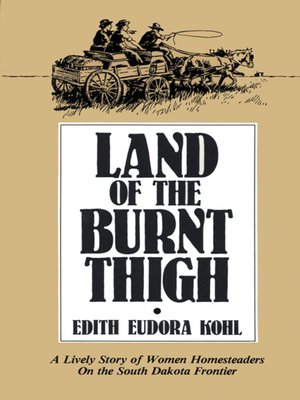
The incredible speed of the transformation of the untouched plains; the invasion of the settlers in droves, lighting on the prairies like grasshoppers; the appearance, morning after morning, of new shacks, as though they had sprung up overnight; the sound of hammers echoing through the clear, light air; plows at last tearing at the unbroken ground—the wonder of it leaves me staggered now, but then I was caught up in the breathless rush, the mad activity to get things done.A South Dakota rancher from west river told me I really should read The Land of the Burnt Thigh, a kind of homesteading memoir by Edith Eudora Kohl, and I'm glad she did. By definition, I suppose, the book is a novel, because Kohl uses her own life in the telling, and her sister's; but she compliments their story with the lives of other women homesteaders she knew in a telling that documents how really tough it was for men and women, white men and women, to put down roots on land that had really never been broken.
That it had never been broken doesn't mean, of course, that it was uninhabited. There were people throughout that endless grassland, people who hadn't determined the land beneath their feet was theirs to "break," to "conquer." "The buffalo and the Indian had each had his day on this land," Ms. Kohl says, "and each had gone without leaving a trace." The blindness in what she sees is almost as breathtaking as the land she describes so richly. But there's no lament here, no memory, and nothing but awe in the face of human possibilities.
It was untouched. And as far as the eye could see, it stretched, golden under the rays of the setting sun. Whether the magnitude of the task ahead frightened or exhilarated them, the landseekers were all a little awed at that moment. Even I, seeing the endless sweep of that sea of golden grass, forgot for the moment the dry crackling sound of it under wheel and foot, and the awful monotony of its endlessness which could be so nerve-racking.Ms. Kohl writes very well. It's hard not to get swept away in the rhapsody she creates. If the story is closely biographical, it's clear that Ms. Kohl and her sister, adventurers from out east, never intended to stay in South Dakota. Once they arrived and found the tar-paper shack some crook told them was a house, they could think of nothing but leaving, maybe even the next day.
But they fell in love with the openness, the freedom, the opportunity, the creativity required simply to live and even to flourish. Last year at this time, I spent two weeks at the National Homestead Monument, just outside of Beatrice, Nebraska, a place that tells the epic story of ordinary people making a life out of a land that wasn't and still isn't all that hospitable. The poverty was immense, the heat unbearable, the cold deathly, the winds constant. That story Edith Eudora Kohl tells and tells movingly.
But what she doesn't see, what her racism blinds her to, is the displacement of a people and a culture who thrived on the plains, "a people who had gone without leaving a trace," she says, eyes shut tight. I really like the book, but anyone who's read Black Elk Speaks can't help but be shocked at what Ms. Kohl doesn't see.
Mark Charles is a Navajo activist, writer, and speaker, who says unequivocally that one of the reasons for the divides which exist and even threaten this country and its people is the fact that we have no collective story. We tell and believe different histories. Until we can create a story together, we'll not live in the same world.
Edith Eudora Kohl's The Land of the Burnt Thigh is a lovely book. It really is. I enjoyed reading it. It documents the hard road white people took to make a Great Plains home for themselves. I'm glad that west river rancher told me it was a book I had to read. She was absolutely right.
But The Land of the Burnt Thigh is also an embarrassment. It documents the racism of white man's blindness. In so many ways, it's a memoir that has so much teach.
No comments:
Post a Comment